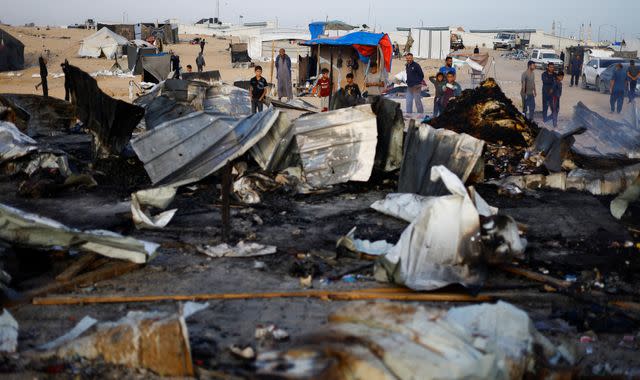'All eyes on Rafah' image shared millions of times on social media following Israeli airstrike

If you're on Instagram, it's an image you will likely have seen: orderly lines of tents stretching into the distance on dusty ground, white structures in the centre spelling out the words "All eyes on Rafah".
On Instagram, a call to action to share the image also clocks the number of people who have added it to their stories: more than 37 million as of Wednesday morning.
On Sunday, an Israeli strike on the southern Gazan city of Rafah hit an area housing displaced Palestinians, setting their tents alight, according to Palestinian medics.
At least 45 people were killed, and footage verified by Sky News showed numerous bodies being pulled from the wreckage of destroyed buildings. In one video, a man can be seen carrying the body of a decapitated child.
Israeli Prime Minister Benjamin Netanyahu labelled the strike a "tragic mistake", while a spokesperson for the Israel Defence Forces (IDF) said much of the destruction was caused by a subsequent fire that could not have been solely ignited by the type of munitions used.
The incident has reignited support for Palestinians on social media, with the "All eyes on Rafah" image shared by celebrities including Bridgerton star Nicola Coughlan, singer-songwriter Kehlani, and one of India's top actors, Varun Dhawan.
Others, including pop star Dua Lipa, have shared different posts, with the words "All eyes on Rafah" included.
Rafah strikes do not cross red line, White House says - follow latest
The phrase seems to have stemmed from Rik Peeperkorn, the World Health Organisation's (WHO) representative in Gaza and the West Bank.
As Gaza braced for an extension of Israel's ground invasion in February, he declared: "All eyes are on Rafah."
The image appears to be one of the first pieces of viral activist artwork to have been created by artificial intelligence.
Marc Owen Jones, a misinformation expert and associate professor of Middle East studies at Qatar's Hamad Bin Khalifa University, told Sky News' US partner NBC News the image "definitely looks" AI-generated.
Among the signs the image was AI-generated are that it does not appear photorealistic, it includes unusual shadows, and the tent camp pictured is unnaturally sprawling and symmetrical - a sign of pattern repetition that is common in AI generation.
While the image has gone viral, photos, and videos, depicting attacks and their aftermath are often hidden behind sensitive content warnings on social media.
Activists have questioned why an artificial image is getting cut-through, instead of footage that shows the reality on the ground in Gaza.
Sky News put this criticism to Meta - Instagram and Facebook's parent company - but did not immediately receive a response.
Read more:
Rafah is 'hell on earth', UN chief says
Why deadly strike on Rafah could be a turning point
The image has also been compared to the black square widely shared during the Black Lives Matter protests in 2020, which was criticised for being performative where it was not accompanied by real action.
Matt Navarra, a social media consultant and industry analyst, told NBC News the image could be a way for activists to share their message while playing by the rules of social media platforms.
By putting text in the images themselves, they may dodge keyword detection moderation applied to image captions, he said.
"It's possibly circumventing some of the automated moderation on the platform, because it's an AI-generated image and there isn't anything in there that is massively dangerous or controversial," he said.


